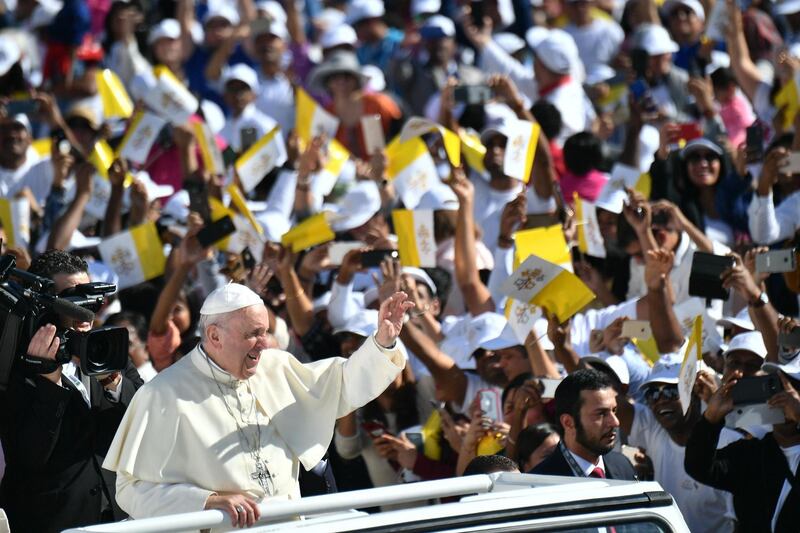Catholics worldwide have become a little blasé about their popes leaving the Vatican to travel to what would once have been headline-making destinations. The Polish pontiff John Paul II, elected in 1978, visited 104 countries in his 27 years in office, more than all of his 263 predecessors put together.
Yet even measured against his extraordinary example, his successor-but-one Pope Francis has made everyone sit up and think again about their age-old prejudices by his trip this week to the UAE. As the first head of the Catholic Church ever to visit the Arabian peninsula, he is sending out an unmissable and important signal of hope and progress in a world perilously short of both at the moment.
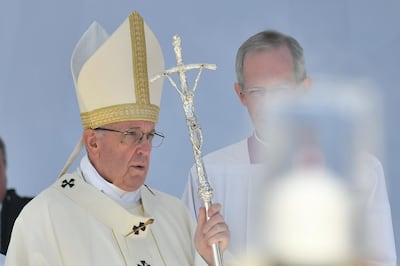
Religion, I am regularly told when I let slip that I am Catholic, is to blame for all the division and strife around the globe, past and present. If only it didn’t exist, we’d be so much happier, they say. Among the evidence deployed to back up such a contention are, among other things, the Crusades, the 15th century Reconquista of the Iberian peninsula in Spain by Catholic monarchs from Muslims, and the vicious conflicts going on right now across sub-Saharan Africa, from Nigeria to Darfur, that once again pit Muslims against Christians.
Religion, of course, is as much about a sense of belonging to a group as it is about believing and can therefore all too easily tip into partisanship that leads to war and bloodshed. So the charges laid against it have some basis, but only as part of a complex fusion of social, economic, dynastic and political factors.
That can be a hard argument to make. I have tried and failed many times. But talking up positive interfaith relationships is certainly going to be easier after Pope Francis’s trip to the UAE. Pictures beamed around the world of the Argentinian pontiff meeting the Grand Imam of Cairo’s Al Azhar, the highest seat of learning in Sunni Islam, are manna from heaven, as is the message of fraternity and dialogue being broadcast at every turn.
“Faith in God unites and does not divide,” Pope Francis has said, in words addressed not just to his audience in the UAE but around the globe. “It draws us closer, despite our differences.” In other words, those differences need not cause war and turmoil.
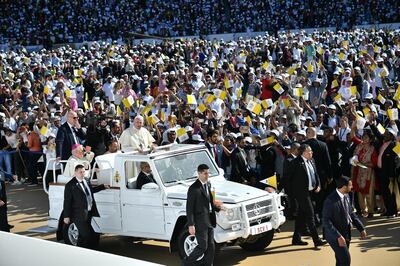
Most of all, Pope Francis’s groundbreaking trip has been a powerful reminder that the earliest community of Muslims, those around in Arabia in the lifetime of the Prophet Mohammed, saw themselves as being in continuity with Christians and Jews. The Quran, after all, refers with the utmost reverence to the prophets of the Hebrew Bible, from Abraham (Ibrahim) up to and including Jesus (Isa). There is, ironically, more mentions of the latter’s mother, Mary (Maryam), in the Quran than in the New Testament.
But for 1,001 very human, very lamentable reasons, it hasn't quite worked out that way in the past 1,400 years and there is clearly still plenty of work to be done. One trip doesn't heal such deep wounds but what it can achieve is to draw attention to the many good initiatives already going on in the Arabian peninsula.
It is 25 years now since I visited Oman as the then editor of a Catholic newspaper in Britain, for the opening of the first Catholic church in Muscat, a gift from Sultan Qaboos bin Said to worshippers who had moved there from the Indian subcontinent and the Philippines. It was a modest, unadorned structure on the outskirts of the capital, run by an elderly Italian priest. I watched as a long line of pilgrims made their way there on foot every Sunday, as there were few transport links.
Fast forward to today, though, and Saint Joseph's Catholic Cathedral in the heart of Abu Dhabi is on the papal route. And in Zayed Sports City Stadium today, a joyous, uninhibited congregation of 150,000 gathered to hear Pope Francis celebrate mass in English, Arabic, Italian, Tagalog, Latin, Korean, Konkani, Malayalam, Urdu and French.
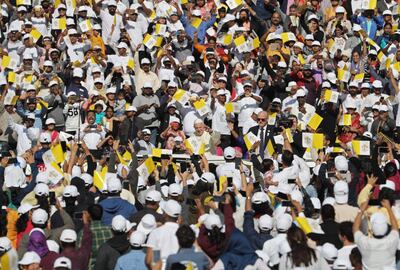
The recent rekindling of that original respect that existed between Islam and Christianity hasn’t always been easy or smooth. In a 2006 address to a German university, Pope Francis’s predecessor Pope Benedict XVI, managed to include (apparently inadvertently) derogatory remarks about the Prophet Mohammed, originally made by a 14th century Byzantine emperor. It sparked attacks on Christian sites in Iraq and the West Bank, caused the Pakistani parliament to pass a motion of censure and saw governments in many of the 50 Muslim-majority countries worldwide condemn the pontiff. Pope Benedict was quick to apologise – not the first instinct of popes over the past two millennia.
It must have worked because, arguably, the warm welcome afforded to Pope Francis demonstrates for all to see the depth of the rapprochement between the two great faiths (there are 1.2 billion Catholics globally and 1.5 billion Muslims) goes.
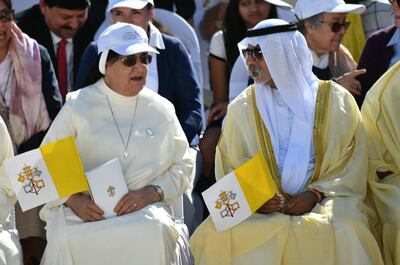
There are, of course, still issues to be resolved. But on the really big challenge of returning religion to its true role as a peacemaker rather than a cause of conflict, you would have to go back eight centuries to the meeting between the current Pope's namesake, Saint Francis of Assisi, and Sultan Malek Al Kamel in Egypt during the fifth crusade to find an event of similar interfaith harmony to compare with events this week in the UAE.
"Human fraternity requires of us, as representatives of the world's religions, the duty to reject every nuance of approval from the word 'war'," Pope Francis said in a speech at the Founder's Memorial in Abu Dhabi yesterday. At an interfaith meeting earlier, Dr Ahmed Al Tayeb, one of the world's most senior Muslim clerics, concurred. "We have agreed," he said, "that all faiths are free from all the armed entities that are causing terror, whichever faith, doctrine or ideologies they have. These are criminals, blood slaughterers and aggressors."
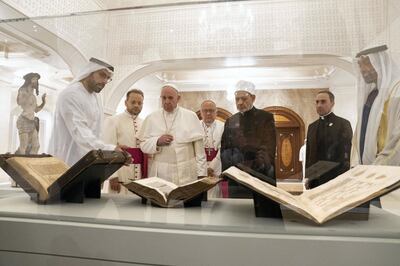
There you have it, in black and white. Fine words, some might say, waiting to be matched by actions on the ground. But now that past hurts, injuries and ill-feeling between these two great faiths have been repudiated at the highest level, those Christians and Muslims who continue to preach hatred in the name of religion are surely exposed as the false prophets they are.
Peter Stanford is a London-based historian and writer. His latest book Angels: A Visible and Invisible History is published by Hodder & Stoughton
